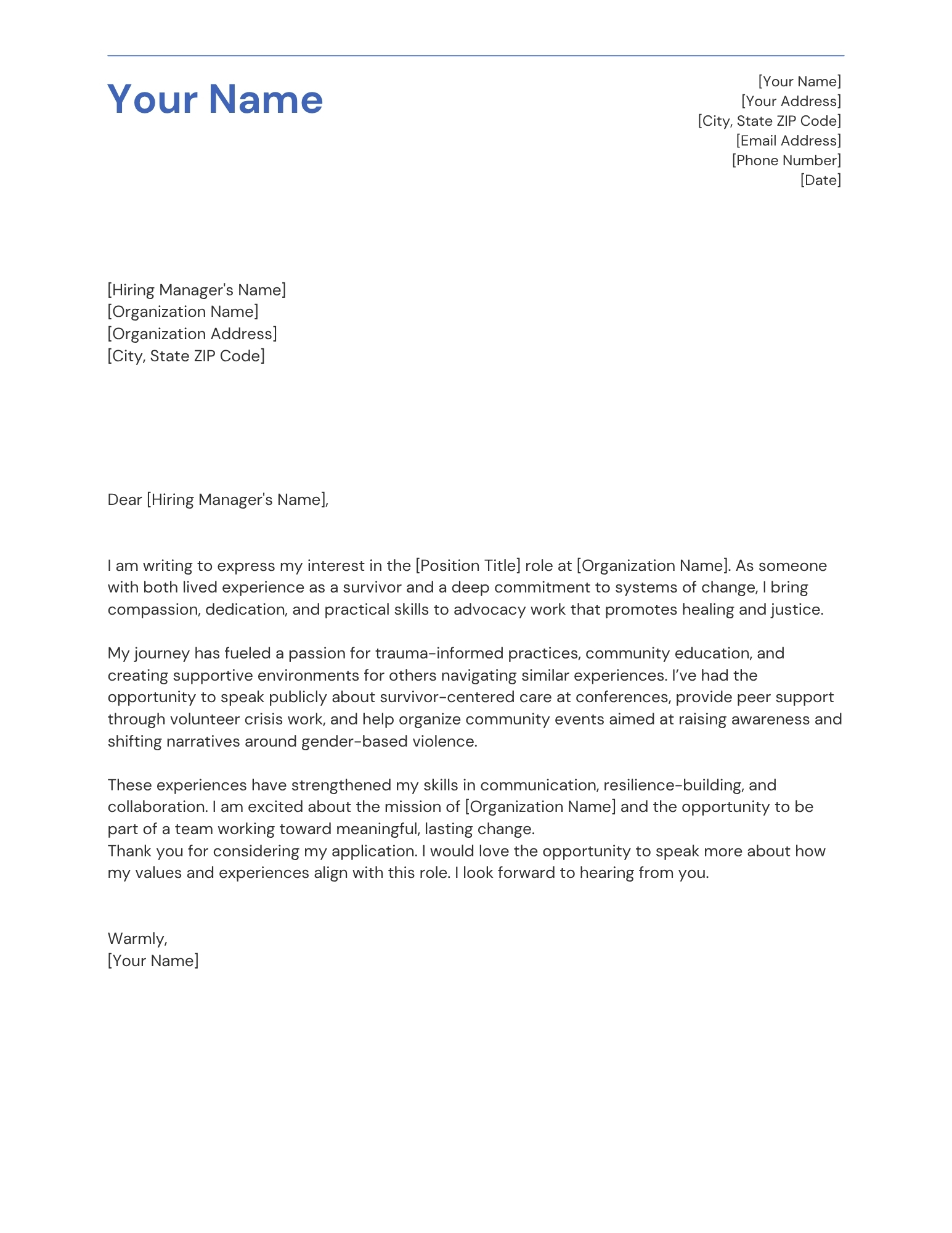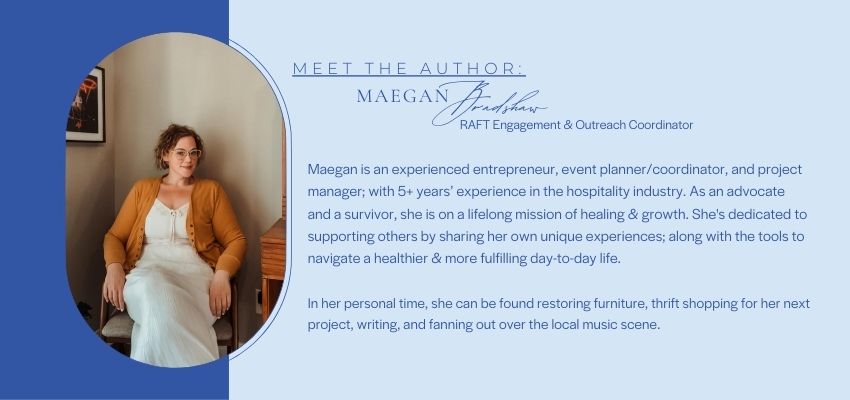Dear RAFT: Can I Put My Lived Experience as a Survivor on My Resume?
Maegan Bradshaw, November 11, 2025
Ask RAFT:
How do we add our lived experiences of survivorship to our resume? How do we document our lived experience to get the job? What about advocacy experiences like volunteering or attending/presenting at conferences?
Yes, absolutely! And here’s how:
How can lived experience and advocacy work be reflected on a resume, especially when it plays such a powerful role in shaping who you are and how you show up? Whether you’ve shared your story at a conference, volunteered with survivors, or supported others through peer mentorship, this kind of experience is incredibly valuable - and it does belong on your resume.
Let’s walk through some ways to do that thoughtfully and strategically.
Framing Your Lived Experience as a Survivor:
You don’t have to label it “survivor experience” on your resume if you’re not comfortable - privacy is important, and how you share your story is 100% up to you. But what you can do is highlight the skills that experience has given you: resilience, empathy, leadership, advocacy, communication... the list goes on.
One great place to start is your ‘Professional Summary’ or ‘Personal Statement’. Here’s a sample:
“Passionate advocate with lived experience navigating trauma and systems of care. Committed to fostering healing, equity, and empowerment through trauma-informed support, storytelling, and education. Skilled in resilience-building, peer mentorship, and systems change.”
You can also showcase your lived experience through your ‘Skills Section'. Some transferable skills might include:
- Trauma-informed communication
- Peer support & mentorship
- Crisis response
- Advocacy & systems navigation
- Public speaking
- Resilience-building
And if you’ve used your experience to support others, through volunteering, speaking engagements, or mentorship - you can absolutely list that under ‘Experience’. For example:
“Peer Advocate | Healing Circle Collective | 2022 - Present
- Supported survivors through peer mentoring and trauma-informed guidance
- Helped connect individuals to local resources and community care
- Participated in organizing events focused on survivor empowerment”
What About Conferences, Volunteering, or Community Organizing?
Whether you’ve attended a conference, presented your story, or volunteered at a local org, those experiences deserve space on your resume, too!
Conference Presentations: If you’ve spoken at a conference, include it under a 'Presentations' or 'Public Speaking' section:
“Speaker, National Sexual Violence Conference (2024)
Presented “Healing Through Advocacy: Lived Experience as a Catalyst for Change” to an audience of 100+.”
Conference Attendance: Even if you didn’t speak, attending conferences shows your commitment to learning and staying engaged.
“Attendee, National Sexual Violence Conference (2024)
Participated in sessions on trauma-informed care, policy advocacy, and community healing.”
Volunteer Work: Volunteering, whether formal or informal, can go under a 'Volunteer Experience' section:
“Volunteer Crisis Advocate | Safe Haven Hotline | 2021–2022
Offered on-call support and resource referrals to survivors seeking immediate help.”
Community Advocacy: Been involved in marches, awareness events, or policy work? Include it!
“Community Organizer | Advocacy for All | 2020 - Present
Organized awareness events and advocacy campaigns that reached 500+ attendees.”
New to the Advocacy World?
Even if, as a survivor, you haven’t formally worked in advocacy, your lived experience still demonstrates powerful, transferable skills that can absolutely belong on a resume.
Here's how someone can express that:
1. Use a ‘Personal Statement’ or ‘Summary’ Section
This is a great place to ground your resume in who you are and what you care about, without disclosing more than you're comfortable with.
Example:
“Motivated, empathetic individual with personal experience navigating complex systems and supporting others through challenging times. Passionate about creating safe, inclusive spaces and applying resilience, emotional intelligence, and community connection in meaningful ways.”
2. Highlight Transferable Skills Gained Through Life Experience
Include a ‘Skills’ or’ Core Competencies’ section with strengths that came from lived experience, like:
- Conflict resolution
- Empathy and emotional regulation
- Trauma-informed communication
- Boundary-setting
- Navigating support systems (legal, healthcare, social services)
- Peer support or mentorship
- Resilience and adaptability
3. Include Informal or Personal Projects
Did you start a support group? Help friends navigate tough systems? Organize anything related to awareness or healing? Those all count!
Example:
“Community Support & Organizing (Self-Initiated) | 2021 - Present
• Supported peers through mutual aid efforts and resource sharing
• Facilitated conversations on trauma healing and empowerment
• Organized awareness events during Sexual Assault Awareness Month”
4. Don’t Underestimate Personal Development or Education
If you’ve taken part in therapy, healing programs, workshops, webinars, or training (even informally), you can include those in a ‘Professional Development’ or 'Trainings’ section.
- Trauma-Informed Care Workshop | 2023
- Ongoing Individual & Group Therapy | 2021–Present
- Mindfulness and Stress Reduction Program | 2022
- Domestic Violence 101 Webinar | 2022
- Community Healing Circles | 2020–2021
A Few Extra Tips for Making Your Resume Stand Out:
- Use your ‘cover letter’ to share your "why?" - what drives your passion for the work?
- Focus on ‘skills’ and ‘impact’ more than personal history - emphasize what you bring to the table.
- Be mindful of how much you want to disclose. You can always say “lived experience” or “personal connection to the work” without going into detail.
Remember:
You don’t have to wait until you have a degree or a certain job title to start claiming your expertise. Your story, your experiences, and the way you’ve chosen to turn pain into purpose - that’s real advocacy. That’s resilience. And yes, that belongs on your resume.
You’ve earned your place at the table. Don’t be afraid to own it. 💙









